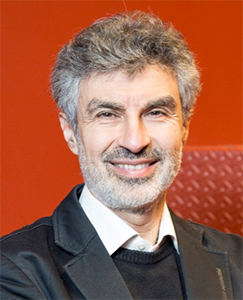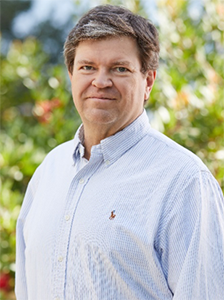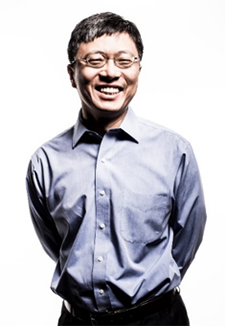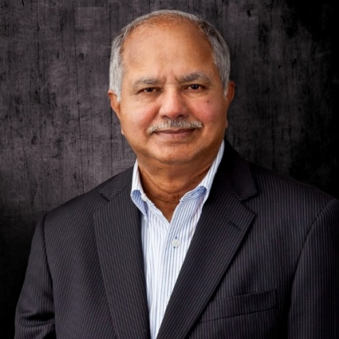50 Years at CMU
The Inaugural Raj Reddy Artificial Intelligence Lecture
Wednesday, November 18, 2020 | 10–11:30 a.m. (EST)
SCS celebrated Raj Reddy's 50+ years at Carnegie Mellon during the inaugural Raj Reddy Artificial Intelligence Lecture. This landmark event featured 2018 Turing Award winners Yoshua Bengio, Geoffrey Hinton and Yann LeCun. Former Executive Vice President of Artificial Intelligence and Research at Microsoft Harry Shum, CMU President Farnam Jahanian, and SCS Dean Martial Hebert also offered remarks.
The complete lecture is available in the video below. Send us a note with any questions, concerns or feedback.
Featured Speakers

Yoshua Bengio
Professor, Department of Computer Science and Operational Research
Université de Montréal
One of the world’s artificial intelligence leaders and a pioneer of deep learning, Bengio has been a professor since 1993 at the Université de Montréal. He is the program director of the CIFAR program on Learning in Machines and Brains, and is the founder and scientific director of Mila — the Quebec Artificial Intelligence Institute — which is the world’s largest university-based deep learning research group. In 2018, he collected the largest number of new citations in the world for a computer scientist. He earned the prestigious Killam Prize, and is a fellow of both the Royal Society of London and Canada. Concerned about the social impact of AI, he actively contributed to the Montreal Declaration for the Responsible Development of Artificial Intelligence.

Geoffrey Hinton
Emeritus Professor, Computer Science Department
University of Toronto
Hinton received his Ph.D. in artificial intelligence from Edinburgh University in 1978. After five years as a faculty member at CMU, he became a fellow of the Canadian Institute for Advanced Research and moved to the Department of Computer Science at the University of Toronto, where he is now an emeritus professor. Hinton was one of the researchers who introduced the backpropagation algorithm and the first to use backpropagation for learning word embeddings. His other contributions to neural network research include Boltzmann machines, distributed representations, time-delay neural nets, mixtures of experts, variational learning and deep learning. His research group in Toronto made major breakthroughs in deep learning that revolutionized speech recognition and object classification. Hinton is a fellow of the UK Royal Society and a foreign member of the US National Academy of Engineering and the American Academy of Arts and Sciences. His awards include the David E. Rumelhart prize, the IJCAI award for research excellence, the Killam prize for Engineering, the IEEE Frank Rosenblatt medal, the NSERC Herzberg Gold Medal, the IEEE James Clerk Maxwell Gold medal, the NEC C&C award, the BBVA award, the Honda Prize and the Turing Award.

Yann LeCun
VP and Chief AI Scientist
Facebook AI
LeCun received an engineering diploma from ESIEE Paris and a Ph.D. from Sorbonne Université. After completing a postdoc in Toronto, he joined AT&T Bell Labs in 1988 and became head of image processing research at AT&T Labs in 1996. He joined NYU as a professor in 2003 and Facebook in 2013. His interests include AI machine learning, computer perception, robotics and computational neuroscience. He is a member of the National Academy of Engineering and a Chevalier de la Légion d’Honneur.

Harry Shum
Former Executive Vice President, Artificial Intelligence and Research
Microsoft
Shum is a world-renowned business executive, computer scientist and educator. As the executive vice president of Artificial Intelligence and Research at Microsoft, he led Microsoft Research — one of the world's premier computer science research organizations — and was responsible for driving the company's overall AI strategy and forward-looking research and development efforts spanning infrastructure, services, and apps and agents such as Bing, Xiaoice and Cortana. He left Microsoft in February 2020 after 23 years to pursue new opportunities in education, business and technology. Shum was elected to the US National Academy of Engineering (NAE) in 2017, and the Royal Academy of Engineering in the UK in 2018. He was named both an IEEE and ACM fellow for his contributions to computer vision and computer graphics. He received his Ph.D. in robotics from the School of Computer Science at CMU.
About Raj Reddy
 Raj Reddy is the Moza Bint Nasser University Professor of Computer Science and Robotics at CMU, where he has held various academic and leadership positions since 1969. He helped create the university's Robotics Institute, and served as its founding director from 1979 until 1991, when he was named dean of SCS. Under his leadership, the school grew to include the Language Technologies Institute, the Human-Computer Interaction Institute, the Center for Automated Learning and Discovery (now the Machine Learning Department), and the Institute for Software Research.
Raj Reddy is the Moza Bint Nasser University Professor of Computer Science and Robotics at CMU, where he has held various academic and leadership positions since 1969. He helped create the university's Robotics Institute, and served as its founding director from 1979 until 1991, when he was named dean of SCS. Under his leadership, the school grew to include the Language Technologies Institute, the Human-Computer Interaction Institute, the Center for Automated Learning and Discovery (now the Machine Learning Department), and the Institute for Software Research.
While Raj has contributed great leadership to SCS, his research has changed the way we interact with technology. Over a span of three decades, he and his colleagues created spoken language recognition systems, developing many of the ideas that underlie modern commercial speech recognition products. He has also made seminal contributions to other areas of artificial intelligence and computer science, including task-oriented architectures, analysis of natural scenes and autonomous robotic systems.
Raj has earned numerous awards throughout his career, including the 1994 ACM Turing Award — the highest honor in computer science — for his contributions to AI. He served as co-chair of President Clinton's Information Technology Advisory Committee from 1999 to 2001. In 2006, he received the Vannevar Bush Award, the National Science Foundation's highest award, for "lifetime contributions to science and long-standing statesmanship in science and on behalf of the nation." Raj also received France's Legion of Honor in 1984, India's Padma Bhushan in 2001, the Okawa Prize in 2004, and Japan's Honda Prize in 2005. He is a member of the National Academy of Engineering and the American Academy of Arts and Sciences. He helped found the American Association for Artificial Intelligence and served as its president from 1987 to 1989.
Support This Lecture Series
About the Raj Reddy Endowment for AI
The Raj Reddy Endowment for Artificial Intelligence celebrates Raj's devotion to CMU, the School of Computer Science and AI in general. At its heart, it promotes the School of Computer Science's research and education efforts in AI and related areas. This includes, but is not limited to, the following initiatives.
Supporting Research
Proceeds from the endowment will underwrite the sort of innovative research programs synonymous with Raj.
Helping Students
Contributions to the endowment will provide much needed fellowship and scholarship resources for students at all levels.
Creating This Lecture Series
The Raj Reddy AI Lecture series, launched with this event, will occur every two years and feature global leaders in AI research and technology.
When you contribute to the Raj Reddy AI Endowment, you acknowledge and celebrate the lasting impact Raj has made on the field. At the same time, you invest in the students, faculty and research that will change how humans and technology interact for generations to come.
Leave a Comment for Raj
Have a favorite Raj story or memory? Or maybe you'd simply like to offer a note of congratulations? Leave your comment below to add to our tribute wall.
